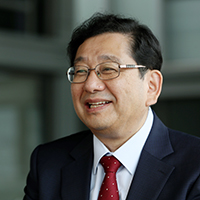
By Yuji Hosaka
Professor at Sejong University
A botanical garden in Pyeongchang-gun County, Gangwon-do Province, has made headlines. This is because of a two-piece bronze statue set showing a man kneeling to ask forgiveness from a girl symbolizing a "comfort woman," a euphemism used by Japan to refer to a sex slave of the Japanese military before and during World War II. Reports said the motif of this work was Japanese Prime Minister Shinzo Abe.
Japanese Chief Cabinet Secretary Yoshihide Suga told a media briefing, "If the reports are true, it would be unacceptable under international protocol." The garden's owner later denied that the statue of the kneeling man represented Prime Minister Abe.
Why did the chief secretary, who heads the Japanese bureaucracy, react so sensitively toward two statues at a private botanical garden? This is perhaps because supporters of the Abe administration expressed their disgust over the statues online. The administration might have also sought not to miss an opportunity to slightly reverse its decreasing approval rating by showing a hard-line stance toward Korea.
For civilians to insult a foreign head of state is inadvisable. In Japan, however, many hateful acts worse than this target Korea or Koreans in daily life but few crackdowns have occurred. Moreover, the history of anti-Korean sentiment in Japan has an extremely long history.
Zaitokukai, the leading anti-Korean nationalist group in Japan formed in December 2006, and similar entities often take to the streets shouting anti-Korean hate speech like "Kill Koreans!" A strict crackdown on such groups for racial discrimination is needed, yet the Japanese government refuses to do so citing freedom of the press.
Last year, former Japanese ambassador to Korea Masatoshi Muto published the book "Moon Jae-in, Korea's Disaster (unofficial translation, 文在寅という災厄)" in both Korea and Japan. The top leader of a country should not be blasted by a book of this type. Because Muto is a former ambassador to Korea, seeing him as an ordinary person is difficult. His book's genre is so popular in Japan that most bookstores there have an "anti-Korean" section for the many publications of this type available.
The same bookstore phenomenon is hard to find in Korea or China. Books espousing such hate speech in Japan properly show the country's true vulgarity. The Korean government has filed no complaint against such insults of the country, its leader and the people to respect freedom of the press.
On the contrary, the Japanese government showed an excessively sensitive response to a privately made statue. This is similar to the canceled exhibition of "Statue of Peace" at last year's Aichi Triennale in Japan. At the time, the Japanese government's unfair involvement over a private artwork became a problem.
Chief Secretary Suga's attitude toward the statue "A Heartfelt Apology" is an inappropriate example of equating the issue of freedom of press because of an artwork at a private botanic garden in another country to a diplomatic issue.
The Japanese government does not ponder the fundamental reason for the creation of such statues and why their number keeps increasing. Tokyo and anti-Korean groups stress that everything was settled by the Korea-Japan Agreement on the Issue of "Comfort Women" Victims 2015. Japan insists that this issue was definitely resolved because its government provided JPY 1 billion to a fund for the victims. The Japanese government has neither issued a sincere apology nor shown any contrition; instead, its attitude is akin to "We paid JPY 1 billion to the consolation fund so shut up."
The 2015 agreement on "comfort women" basically aims to restore the honor and dignity of all the victims. Prime Minister Abe, however, broke this promise within 20 days. On Jan. 18, 2016, he told the Japanese Diet, "No record shows that 'comfort women' were mobilized against their will," ridiculing and humiliating the victims again.
If no record on such forced mobilization exists, his comment means that the victims voluntarily became "comfort women." Later on Feb. 16, 2016, at the United Nations Commission on Human Rights, Japanese Deputy Foreign Minister Shinsuke Sugiyama said, "'Forceful taking away' of 'comfort women' by the military and government authorities could not be confirmed in any of the documents that the Government of Japan was able to identify," adding, "The expression 'sex slaves' contradicts the facts." As a result, the commission strongly complained by saying, "History is history. No one can change and deny history or historical facts."
"Now from your statement, I found that the stance of the Japanese government is actually contradictory. On one hand, you said you deny the history, you deny the issue of 'comfort women.' On the other hand, you're talking about how you felt so pleased to reach an agreement between the Japanese government and the Republic of Korea. According to you, if there is no such issue, why did the Japanese government have to reach an agreement with the Republic of Korea?"
Unless the Japanese government sincerely changes its attitude toward the victims, more statues like "A Heartfelt Apology" and "Statue of Peace" will continue being made not only in Korea but also many places in the world.
Hosaka teaches political science at Sejong University in Seoul. As a naturalized Korean of Japanese descent, he is also director of the Dokdo Research Institute.
Translated by Korea.net staff writer Yoon Sojung.